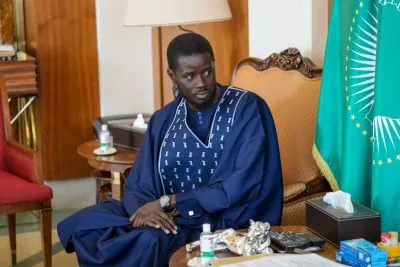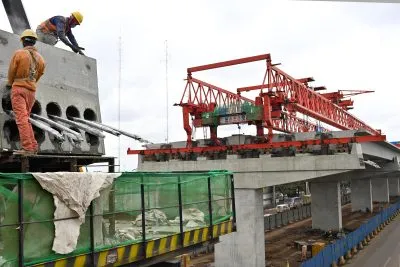To paraphrase the ‘godfather of investing’, Warren Buffett, it is only when the tide goes out that you can find out who’s been swimming naked. Covid has unleashed the equivalent of a Tsunami, taking both good and bad businesses in its wake.
It is in times of such crises that organisations such as his need to step up and prove their worth, says Felix Bikpo, the outgoing CEO of the African Guarantee Fund (AGF).
Although Bikpo accepts that the fallout from Covid-19 will have far reaching impact, he is confident that with the right actions, the impact can be mitigated.
His team, he tells us, has been in overdrive – it has had more discussions with banks than at any previous period. “This is a positive sign,” he says. “it shows that banks understand the critical role that they need to play in the economic recovery plan and in supporting the real economy – that is the SME sector.”
This is the second severe exogenous shock in the space of ten years that African banks have had to deal with – the first being the financial crisis that led to a severe global economic contraction and threatened to bring down the global financial system.
Nevertheless, Bikpo is convinced that the financial system, like it did 10 years ago, will prove resilient although it will require concerted action from multiple stakeholders – the banks themselves, development finance institutions such as his, the regulators and to some extent governments, “to make sure they don’t crowd out the private sector” he adds.
The larger companies, he explains, which can draw down on credit lines and will have deeper cash reserves, should be able to weather the storm. “As is often the case, it is the smaller companies, on which our economies depend, that will suffer the brunt of this shock,” he says.
“Lockdowns go against the very essence of economies that depend on markets, street vendors and where the informal sector is still a large component of the economy.”
SME lending today represents, on average, 20% of a bank’s portfolio, he says. Without intervention and support to the banks, he’s worried that this figure could down to as low as 2-3%, “which would be catastrophic”.
Squaring the circle
Felix Bikpo joined the African Guarantee Fund as its founding CEO nine years ago. He says he took the job under one condition: that the Fund’s approach to SMEs would have to be completely different from accepted practice.
The founding shareholders, the African Development Bank and the development agencies from Denmark and Spain, supported his approach. “By challenging the whole SME lending model, we have so far unlocked around $2bn worth of lending to the SME sector,” he says. This was done by helping de-risk lending to SMEs and also by working with banks to better manage their SME risk assessment and also to modernise their own internal systems in terms of technology.
With guarantees from the Fund, banks no longer need to layer several provisions when lending to SMEs – making margins in this vital sector financially viable.
Banks can leverage the Fund’s AA- Fitch rating whilst sharing the risk. The circle has effectively been squared.
Stability then stimulus
Bikpo says that his organisation’s response to the crisis has been a two-pronged approach. “The first is stabilisation – protecting the existing loan portfolio, giving companies the time to build resilience and not default,” he says.
“The second is stimulus – to assist banks increase lending to SMEs to help kick-start economic growth. Banks will inevitably be more cautious and risk averse, so we’ll bear some of that risk burden to encourage them to lend, spur entrepreneurship and help SMEs be an engine of growth.”
To do this, the Fund is going to market to raise an additional $300m which, Bikpo estimates, will help unlock an additional $1.2bn of lending over the course of the next 18-24 months.
The stabilisation aspect of the Fund has even extended guarantees to include loans disbursed by banks pre-Covid, thus helping banks restructure the loans and providing the necessary support for the SME sector.
Will he lose money from this? Yes, he says, “but that is how the business model should work.” Will that impact the Fund’s rating? “No. We have sufficient buffers and liquidity.”
This new funding will only solidify AGF’s position and will enable it to extend its services even wider. “The only source of finance for SMEs are financial services. If either collapse, African economies will collapse,” he says, highlighting the urgency of the matter. “If the AGF cannot support the SME sector now,” he argues, “then it shouldn’t exist.”
He says Central Banks across the continent have, on the whole, acted decisively and have done the right thing by, for example, providing flexibility in capital requirement and extending the period before which a loan becomes non-performing – thus providing more time for banks and businesses to restructure these loans and enable a revival of the economy.
Time is of the essence
What business need to bounce back, he says, is time on their side, but how much time is the unknown factor. African economies are varied – one-size-fits-all generalisations cannot be made.
A great deal will depend on factors such as when travel restrictions are lifted to kick start tourism and hospitality or the speed of global economic recovery for commodity exporters.
It is estimated that two thirds of growth on the continent is from domestic consumption so the “attitude of the consumer will also be critical and it’s hard to predict how quickly this will come back,” he says. Public investment and the role of banks will therefore be key to kick-start growth.
What sectors are most affected by the crisis? Tourism, he responds, especially in terms of the loan portfolios his banking clients are involved in. “Followed by transport and logistics – and also energy, especially off-grid providers, will be particularly adversely hit.”
Although the current situation has tempered some of its ambitions, the organisation’s remit will continue to increase. For example, AGF has been chosen by the AfDB and its partners to manage a $300m initiative to increase lending to women-led businesses. It is expected to unlock $3bn worth of financing – the financing gap for women is estimated at $42bn.
How does he look back on the last nine years? He says that his biggest achievement was “to show that with a little ingenuity, it is possible to unlock problems and overcome what at first may appear to be deadlocked”.
Related articles
Interview: Felix Bikpo, Group CEO, African Guarantee Fund
“The AGF has enabled over $700m of loans to more than 8K SMEs,” Felix Bikpo, CEO of AGF
Want to continue reading? Subscribe today.
You've read all your free articles for this month! Subscribe now to enjoy full access to our content.
Digital Monthly
£8.00 / month
Receive full unlimited access to our articles, opinions, podcasts and more.
Digital Yearly
£70.00 / year
Our best value offer - save £26 and gain access to all of our digital content for an entire year!
 Sign in with Google
Sign in with Google 




